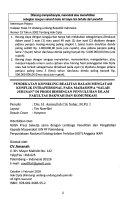Buku pelajaran Sejarah Kebudayaan Islam untuk Madrasah Aliyah (MA) Kelas X ini disusun tetap berdasarkan Kurikulum Madrasah yang dikeluarkan Menteri Agama RI Tahun 2013, yang dalam pelaksanaannya berpedoman kepada Keputusan Menteri Agama RI No. 165 Tahun 2014, dan Surat Edaran Dirjen Pendis Kemenag RI Tahun 2015, terdiri atas 4 Bab. Setiap bab mengandung: uraian materi pelajaran, rangkuman, hikmah, evaluasi dan tugas dari bab yang bersangkutan.
Hasan, Hasan Ibrahim, Tarikh al-Islam as-Siyasy ad-Diny, as-Saqafy alIjtima'i, (Cairo: Maktabah an-Nahdlah al-Misriyah, 2001), Vol. 1,2,3,4. Hodgson, Marshall G.S, The Venture of Islam (Iman dan Sejarah Dalam Peradaban Islam, ...










